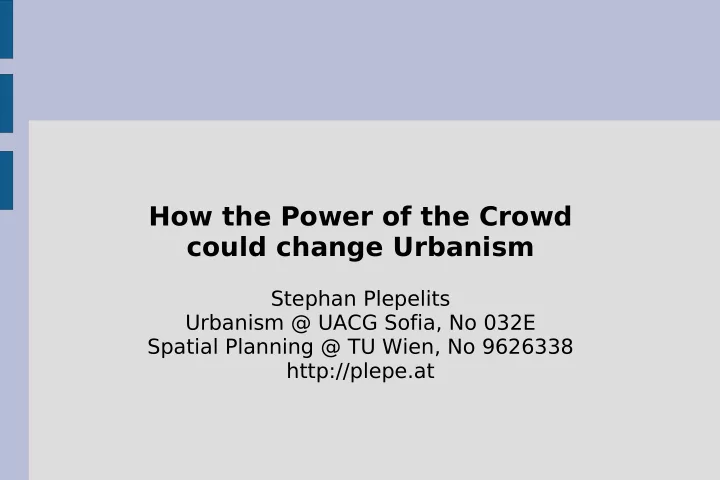

How the Power of the Crowd could change Urbanism Stephan Plepelits Urbanism @ UACG Sofia, No 032E Spatial Planning @ TU Wien, No 9626338 http://plepe.at
Introduction ● What I'm gonna talk about? ● Definitions – Information Age, Information – Digital vs. Analog, Internet – Culture, Digital Culture – Democracy: Representative vs. Participative
Working together: Free Software Movement ● Linux, GNU, GNU General Public License ● Freedom – The freedom to run the program, for any purpose. – The freedom to study how the program works, and adapt it to your needs. – The freedom to redistribute copies. – The freedom to improve the program, and release your improvements. ● First uses: – UNIX-Community (1960-1970) – GNU (Richard Stallman, 1983) – Linux (Linus Torvalds, 1991)
Working Together: Free Software Distribution Distributions Software
Economic Models ● Firm economy: Tourist agency ● Market economy: “Fiaker” in Vienna ● Gift economy: Ask for the way ● Commons based Peer Production: “CouchSurfing”
Society, Culture: CouchSurfing ● CouchSurfing.com – Don't go to a hotel – stay at someone who lives there! – Cultural exchange by traveling – >1,1 Mio registered users – Trust
Commons-based Peer Production ● Characteristics – See intellectual property as common good – no/few hierarchies – “peers” decide where and what to work – forking ● Creative Commons Licence – Attribution – Commercial use – Modifications
ThruYOU – Kutiman mixes YouTube Unfortunately not Creative commons :(
Urbanism ● How can we use “Peer Production” ● Politics – Participative democracy – Bottom-up instead of top-down ● Open Data – Municipalities should make data easily accessible – Communities will build applications themselves
District of Columbia: Apps for Democracy ● “Citywide Data Warehouse”, live feeds – building permits – crime incidents – purchase orders ● In 2008: Contest for best use of data → 47 apps – e.g. Park IT DC, stumble safely, Historical Tours, Crimes
U.K. MySociety ● “Democracy”-Services for population (U.K.) – TheyWorkForYou, No10 Petitions Website, FixMyStreet ● Free Software – adaptable for other communites
OpenStreetMap ● “Free” map of the world – like Wikipedia ● Raw data can be used for maps, GIS, navigation, routing, ... ● Projects: Cyclemap, Hiking, Public Transport, Seamap, ...
The End Thanks for your attention! Download this presentation from http://plepe.at
Recommend
More recommend